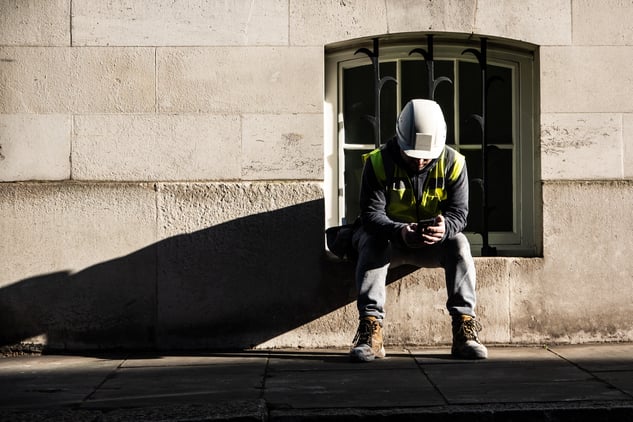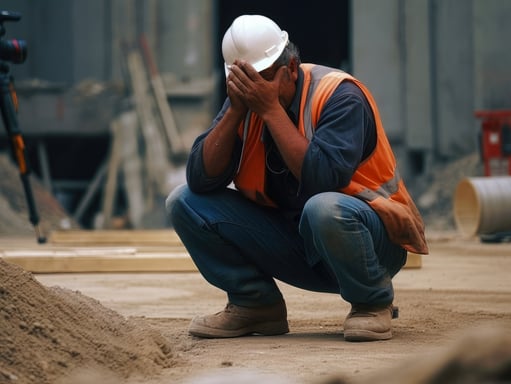May is Mental Health Awareness Month, a time to shed light on the importance of mental well-being across all professions. This year, let’s focus on a critical sector – the construction industry.
Construction work is demanding, both physically and mentally. Workers face long hours, exposure to the elements, and the constant pressure to meet deadlines. Unfortunately, these factors can contribute significantly to mental health challenges within the construction industry.
A Silent Struggle: The High Rates of Mental Health Issues in Construction
The mental health struggles of construction workers are often a silent crisis. While physical safety hazards receive significant attention, the emotional well-being of the workforce can be neglected. The numbers paint a concerning picture:
- Suicide Rates: According to the National Institute for Occupational Safety and Health (NIOSH), construction workers have one of the highest rates of suicide compared to other industries. The Centers for Disease Control and Prevention (CDC) reports that in 2020, the suicide rate for construction laborers was 53.2 per 100,000 workers. This is a staggering four times higher than the national average (17.3/100,000) and five times higher than all other construction fatalities combined (10.1/100,000). These statistics reveal a crisis demanding immediate attention.
- Anxiety and Depression: A 2020 survey by the Associated General Contractors of America (AGC) found that 14.3% of construction workers struggle with anxiety and nearly 6% struggle with depression. These numbers are significantly higher than the national averages for anxiety (8.1%) and depression (6.9%) according to the National Institute of Mental Health (NIMH). The prevalence of anxiety and depression within the construction industry suggests a workforce facing a significant mental health burden.
- Substance Abuse: Mental health struggles and substance abuse often go hand-in-hand. The Substance Abuse and Mental Health Services Administration (SAMHSA) reports that construction workers have a rate of substance abuse disorder nearly double the national average. This self-medication can have serious consequences for worker safety, health, and overall well-being.
These statistics are just a glimpse into the silent struggle faced by many construction workers. Understanding the underlying factors that contribute to these high rates of mental health issues is crucial to developing effective solutions.

Why Are Construction Workers at Higher Risk?
The demanding nature of construction work and the unique culture of the industry create a perfect storm of risk factors that can significantly impact the mental well-being of construction workers:
- Physically Demanding Work and Chronic Pain: Construction sites are inherently hazardous environments. Workers often perform strenuous physical labor that can lead to chronic pain, injuries, and fatigue. This physical strain takes a toll on mental well-being, contributing to feelings of frustration, helplessness, and decreased ability to cope with stress. The constant ache and discomfort can disrupt sleep patterns, further exacerbating mental health issues.
- Job Insecurity and Financial Strain: The construction industry is known for its cyclical nature. Economic downturns can lead to project delays, layoffs, and job insecurity. The constant worry about making ends meet, coupled with the potential for financial strain, can be a significant source of stress and anxiety for construction workers. This financial insecurity can also impact their ability to access mental health care services, creating a vicious cycle.
- Macho Culture and Stigma Around Mental Health: Traditional masculinity can be a major barrier to seeking help for mental health issues. The “tough guy” image often associated with construction work can discourage workers from admitting they’re struggling or seeking support. This stigma surrounding mental health prevents them from accessing the resources and professional help they need to cope effectively.
- Social Isolation and Lack of Support: The transient nature of construction projects can lead to social isolation for workers. Constantly moving from job site to job site can make it difficult to build lasting friendships or establish a strong support network. Feeling isolated and alone can exacerbate feelings of loneliness, depression, and anxiety. This lack of social support further weakens their resilience in the face of mental health challenges.
- Exposure to Trauma: Construction workers may be exposed to traumatic events on the job site, such as witnessing serious accidents or fatalities. These traumatic experiences can lead to post-traumatic stress disorder (PTSD) and other mental health issues. The emotional toll of such events, coupled with the difficulty of seeking help due to stigma, can create a significant burden on their mental well-being.
By understanding these unique risk factors, employers, industry leaders, and mental health professionals can develop targeted interventions and support systems to address the mental health crisis within the construction industry. Creating a culture of mental health awareness and promoting help-seeking behaviors are crucial steps towards building a more resilient and supportive work environment for construction workers.

Building a Culture of Mental Health Awareness
There’s a growing recognition of the need to address mental health in the construction industry. Here are some ways to create a more supportive environment:
- Employer Education: Educating employers on the signs and symptoms of mental health issues can help them identify workers who may be struggling and encourage them to seek help. Resources from organizations like the Workplace Mental Health Alliance can be a valuable starting point.
- Employee Assistance Programs (EAPs): Offering confidential EAPs can provide construction workers with access to mental health professionals and support services.
- Promoting Open Communication: Creating a safe space for workers to discuss mental health concerns is crucial. Supervisors who encourage open communication and reduce the stigma around mental health issues can make a significant difference.
- Building a Support Network: Encouraging peer support networks within construction crews can provide a sense of camaraderie and belonging. Knowing they’re not alone in their struggles can be a powerful source of strength for workers facing mental health challenges.
Building a Culture of Support: A Shared Responsibility
May serves as a timely reminder to prioritize mental well-being in all workplaces, including the construction industry. By raising awareness, promoting open communication, and providing access to support resources, we can help construction workers build resilience and create a safer, healthier work environment for all. However, creating lasting change requires a collaborative effort from various stakeholders:
- Employers: Construction companies have a crucial role to play. Investing in mental health awareness training for supervisors, creating a culture of open communication, and offering Employee Assistance Programs (EAPs) are essential steps. Providing flexible work arrangements and prioritizing work-life balance can also significantly reduce stress for construction workers.
- Industry Leaders: Associations and advocacy groups within the construction industry can play a vital role in promoting mental health awareness campaigns and lobbying for improved mental health resources and support systems specifically tailored to the needs of construction workers.
- Mental Health Professionals: Mental health professionals can develop targeted outreach programs and educational materials specifically addressing the challenges faced by construction workers. Offering specialized treatment programs that consider the unique stressors of the industry can be highly beneficial.
- Construction Workers: Taking care of mental well-being is a shared responsibility. Construction workers can play a vital role by educating themselves about the signs and symptoms of mental health issues, seeking help when needed, and creating a culture of support among their peers. Openly discussing mental health challenges can help break down stigma and encourage others to seek help.
Building Resilience: A Lifelong Journey
Mental health is an ongoing journey, not a destination. By working together, we can build a more supportive and understanding environment within the construction industry. Equipping construction workers with the tools and resources they need to manage stress, cope with challenges, and prioritize their well-being is essential. May Mental Health Awareness Month serve as a catalyst for lasting change, ensuring the mental health and well-being of construction workers becomes a top priority alongside physical safety on every job site. A healthy and resilient workforce is the foundation for a thriving construction industry, where everyone can build a brighter future, both personally and professionally.

